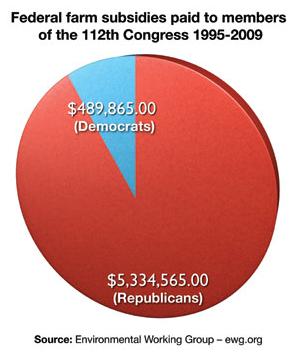Last updated on 2011.04.04
Pop quiz! Suppose you have 23 farmers. Seventeen of them are Republicans. Six of them are Democrats. They've all received federal farm subsidies. Boom—that's all you know.
How much farm subsidy money would you guess those six Democrats have received compared to those seventeen Republicans? Or numerically, what's the ratio between total Dem subsidies and total GOP subsidies in this group? Possible answers:
- 2:1. Those six Dems got twice as much as those seventeen Republicans. Even a handful of blood-sucking pinko Dem parasites will take lots more government handouts a whole bunch of red-blooded, Friedman-fearing Republicans.
- 1:1. Those six Dems drew the same amount as those seventeen Republicans, since Democrats do tend to put more faith in government programs than Republicans.
- 6:17. Individually, they all averaged the same amount. When it comes to farming, everybody's got to make ends meet, so quit looking for blog fodder, Cory!
- 1:11: Individually, the Republicans averaged four times as much in subsidies as the Democrats.
Now, suppose the 23 subsidized farmers we're talking about were the 23 members of the 112th Congress who appear in the farm subsidy database. How much of the subsidy pie have they eaten over the last fifteen years?

The answer, courtesy of the Environmental Working Group:
- $5.3 million for seventeen Republicans—$313K per Elephantine Congressperson.
- $490,000 for six Democrats—$82K per Dome Donkey.
As a group, the Republicans currently in Congress have taken nearly eleven times as much in farm subsidies as their current Democratic counterparts. Individually, those Republicans have taken nearly four times as much as the Dems across the aisle.
To be fair, one of the Republicans really bends the curve... and it's not our dear Kristi Noem! She's only third on the list. EWG is even nice to her and, instead of counting her whole family's subsidy take of over three million dollars, multiplies the total Noem clan haul by Kristi's ownership share in Racota Valley Ranch and ascribes a mere $443,748 to our Congresswoman personally.
The big GOP subsidy hog is Rep. Steven Fincher from Tennessee, whose farm operations have slurped up $3.37 million in subsidies in the last fifteen years. Take him out of the pool, and the remaining sixteen Republicans average only $123K individually... only 41% more than their subsidized Congressional farming colleagues across the aisle.
Thank you, dear EWG and Kristi, too, for making blogging easy!
Update 14:07 CDT: EWG found another one! I have revised the text and numbers here to reflect 6 Dems and 17 Republicans.
Update 15:35: When you're making millions of dollars from Uncle Sam, who cares about a little dust? Reps. Fincher and Noem are hollering to get the EPA out of farmers' lives, but USDA intervention in their market with subsidy checks remains welcome.
Update 2011.04.04: The Noem family's corporate welfare earns our Congresswoman dishonorable mention in some Oklahoma commentary titled "Hypocrisy Reigns."

Since I seem to be seeing corporate and government collusion everywhere lately, I'd be interested to see how much money big ag corporations have given to these "gentleman farmers."
ABC's GMA ran a interesting story about members of Congress and their farm subsidies. One of the Tea-baggers wouldn't answer the question why they are still accepting subsidies and when they would (congress) stop paying them out.
Thanks for keeping us posted on Noem & farm policy.
I am searching for a vid I found here before, Noem's interview last fall with RC Journal. Link, please? She refers to the "cheap food policy" in this country.
Has that become a cheap gas policy? It's at least obolete. In practice, the cheap food policy kept farmers growing vital grains even to the point of high surplusses, then compensated them for the low prices that result. It made sense in a way although farmers where kind of trapped in it. Now farmers have the freedom to grow the crops they choose yet still get federal payments. So that mandatory planting aspect of the policy is gone.
Farmers have chosen to grow fuel, so the "cheap food" aspect of the policy is disappearing also. Well, the corn ethanol industry is one reason crop prices have been at historical highs recently. But high crop prices are just another reason to phase out the other aspect of the policy, which is to give farmers compensatory payments.
If farm policy's not about food, and it's not keeping food cheap, then what is it for?
Good points, Michael! The October 2010 RCJ video to which you refer is available here: http://madvilletimes.blogspot.com/2010/10/noem-on-farm-subsidies-everybody-else.html